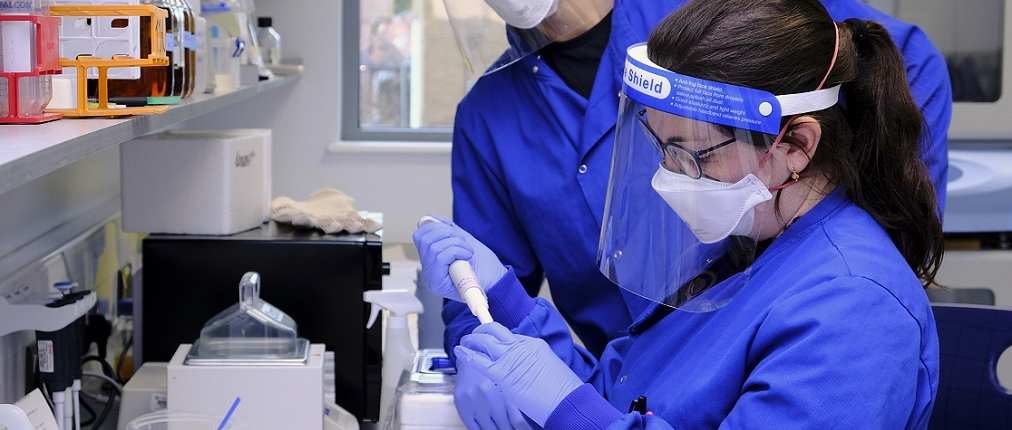Hartley News Online Your alumni and supporter magazine
Southampton scientists and academics remain on the frontline of COVID-19 research, working together to find new ways of fighting the disease. From testing potential vaccines, to assessing the impact on young people, to highlighting the important effects of ‘long COVID’, our research is helping to protect the vulnerable and bring an end to the pandemic.
Booster vaccine research
In May, the UK Government announced the University was to lead the Cov-Boost study, an international clinical trial to investigate how effective a booster of each vaccine is in protecting the individual from the virus. Seven different COVID-19 vaccines are being used as potential boosters, given at least 10 to 12 weeks after a second dose as part of the ongoing vaccination programme. Initial findings are expected in September.
Saul Faust, Professor of Paediatric Immunology and Infectious Diseases at the University, is the trial’s Chief Investigator. He said: “This trial will give the Joint Committee on Vaccination and Immunisation (JCVI) the important data to inform their recommendations of how to protect the population against any future wave. It is fantastic that so many people across the country have taken part in vaccine trials up to now so that we can be in a position to study the effects of boosters.”
Protecting people with cancer
Over the course of the pandemic, it has become clear that the virus affects different groups of people in different ways. The question remains, however, will a vaccine protect these different groups of people? Our researchers are involved in other COVID-19 vaccine trials to help answer this.
Dr Sean Lim, from the University’s Centre for Cancer Immunology, is leading a new observational trial, evaluating immune responses in patients with lymphoid cancers to COVID-19 vaccines. Patients with lymphoid malignancies have weakened immune systems as a result of their disease or treatment, and are therefore at greater risk of developing severe COVID-19 disease – and also less likely to be protected by vaccines. The collective data from the study will be critical to help understand whether these patients require a different vaccination approach.
First vaccine study in pregnant women
The University is one of a number of National Institute for Health Research (NIHR) sites taking part in the first COVID-19 vaccine study in the UK recruiting pregnant women. The phase 2/3 study aims to further understand the safety, tolerability, and immunogenicity of the Pfizer-BioNTech COVID-19 vaccine in healthy pregnant women.
Pregnant women are now offered approved COVID-19 vaccines at the same time as the rest of the UK population, based on their age and clinical risk group. The role of this placebo-controlled study (COVID-19 Vacc Maternal Immunisation) is to provide more robust information on the vaccine immune response in pregnancy, as well as safety reporting and the potential transfer of maternal antibodies to infants.
Dr Chrissie Jones, Associate Professor in Paediatric Infectious Diseases at the University and Chief Investigator of the study, said: “While we have a large amount of real-world data which tells us that it’s safe for pregnant women to receive approved COVID-19 vaccines, the data gathered from a controlled research study like this will give us more information about immune response and antibody transfer.”
The social side
Throughout the pandemic, people have jumped online to find out the latest developments and to seek information on the virus. But new research from Professor Will Jennings in the University’s Department of Politics and International Relations showed people who look to social media for information – particularly YouTube – are less willing to be vaccinated against COVID-19.
Working with researchers at the University of Oxford, Professor Jennings found that unregulated social media sources poses a particular problem in contributing to vaccine hesitancy. The article, published in the journal Vaccines, warns that social media users can fall prey to an ‘echo chamber’ effect – where tailored recommendations, based on an individual’s ‘watch history’, underline an individual’s concerns, and rarely provide alternative or expert views.
Royal recognition
Two leading academics from the Faculty of Medicine were awarded MBEs in the New Year Honours for 2021.
Medical Doctor and Clinical Scientist Professor Keith Godfrey was recognized for services to medicine during the COVID-19 response; specifically, he has led in conceiving, developing, and successfully executing the pivotal saliva test programme in Southampton to assist the UK government in negotiating its emergence from the pandemic.
Dr Nisreen Alwan, from the Faculty of Medicine, has been campaigning for long COVID to be recognised as a chronic condition since she experienced the illness in March 2020. As well as taking part in online events to discuss the condition, she has written for the British Medical Journal and The Conversation. Her persistent scientific and public advocacy was instrumental in the recognition of long COVID on a national and international level, and led her to receiving an MBE for services to medicine and public health in New Year Honours list. This achievement follows her earlier inclusion in the BBC 100 Women of 2020 list.
Long COVID is one of the pandemic’s biggest mysteries. Extreme tiredness, shortness of breath, chest tightness, and difficulty sleeping are just some of the symptoms, but little is known about why it can affect some people and not others. Some trade unions are now calling for it to be classed as a disability.
Our online events programme
During the past year, the University’s Events team held a number of online events giving you the chance to hear from the scientists and medics at the coalface of the pandemic. More than 1,700 have tuned into the live events, and just over 9,000 have later caught up with the recordings on YouTube.
The most recent lecture saw academics from Health Sciences discuss the University’s important role in training hundreds of people in the community to be able to deliver COVID-19 vaccines, as well as their work to design new templates for safe PPE devices – ensuring they fit for all individuals, and interface safely with their skin.
Other Distinguished Lectures include Professor Peter Johnson discussing the impact of COVID-19 on cancer services, Professor Andy Tatum exploring how data can help design better strategies to control COVID-19, and Professors Rob Read, Saul Faust, and Lucy Yardley discussing the University’s contribution to vaccine development and rollout, human trials, and preventative measures for the virus.
The University’s pioneering coronavirus research has spanned all faculties, and brought academics, scientists, researchers, and lecturers together. Our multidisciplinary teams will continue to push the boundaries of this research, and work to find new ways of combating the disease as we, as a society, learn to live with it.
To read more of these stories, visit our dedicated webpage.



